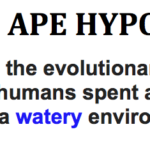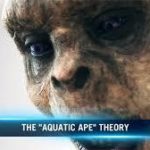Before I get into it, just know the pictures just serve as visual representations, not actual pictures
Okay so anyway, evidence for this theory is the following:
THE FACT THAT HUMANS ARE SO HAIRLESS:
Only two kind of habitats give rise to hairless animals, an aquatic one and a one below the ground (a naked mole rat for example)
.The suggestion that humans have become hairless to prevent overheating has been rendered false because hair can act like a defense against the sun.
This is why camels retain their fur even in the hot dessert environment.
OUR FAT CELLS
We have ten times the number of fat cells as expected in an animal our size. Only two types of animals have large fat cells: hibernating and aquatic ones.
In hibernating it’s seasonal fat, but in aquatic it’s all year round. It’s unreasonable to think that we evolved this feature in land because large fat pockets would have just slowed us down.
Primate babies are always born slender, but human babies start to develop fat even before birth.
WALKING ON TWO LEGS
So we’re the only mammals that have developed bipedalism. This is a surprise, because walking on 2 legs vs. walking on 4 legs is very disadvantageous. It’s slower, unstable, our organs are vulnerable to damage.
One theory is that if our habitat was flooded, we’d have to walk on two legs to keep our heads above the water.
The only animal who has ever evolved a pelvis like ours, the swamp ape, used this method.
BREATHING
We have conscious control over our breathing. Ever other land animal doesn’t. Mammals like dolphins and seals also conscious control because it tells them how deep they are going to dive and they can estimate how much air they need to inhale.
OTHER DIFFERENCES
Our body is so wasteful of salt and water. Think of tears and our way of sweating. Other land mammals don’t have this. Water mammals do however.
Okay anyway I hope you learned something.
Here’s a source and where you can find more information: X
For more interesting posts like this, go here: X
Hey, op, I went to your blog and saw that you want to explain the paranormal in a scientific way. Honestly, I can’t tell if this is a joke post or not because you seem pretty serious in your quest. But, in the end, spreading false information isn’t cool. The Aquatic Ape Hypothesis isn’t taken seriously in the scientific sphere of biology or evolution. It’s not even a recognized theory, either.
The reason why it is continually perpetuated is because it’s a very phantasmagoric idea; it also makes mermaids sound more real!
I understand that it’s interesting, but the actual theories of human hairlessness, fat cells, bipedalism, and sweating are far more interesting! Not only this, but they are backed up by facts and can be more thoroughly investigated.
I’m only going to talk about hairlessness right now, because it’s a really cool thing you should know about!
In closing, if this is a joke, please state it in big red letters at the top. I love tumblr, but tumblr does take a lot of things out of context. Spreading false truths is not a good thing. Please refrain from this in the future.THE FACT THAT HUMANS ARE SO HAIRLESS:
You’re making the mistake of taking human hairlessness out of it’s original context, friend. Also, humans aren’t the only land mammals that are hairless – so you’re first defense gets blown out of the water (punintended): Pigs and elephants for example. And being aquatic doesn’t automatically make a mammal hairless, seals and walruses are covered in a layer of fur.
In any case human hairlessness is around for three major reasons: Heat regulation, parasites, and bipedalism.
Heat: Hair is an insulator, which keeps animals warm. Therefore, hair does protect from direct sunlight, but does not stop heat from being generated. So, no, that theory has not been “rendered false” because hair does not regulate heat, but traps it. Sweating, however, regulates heat. Hairlessness has the advantage of being able to quickly cool due to sweating and evaporating.
Due to heat: http://news.discovery.com/human/evolution/humans-lost-fur-hot-climate.htm
http://www.ncbi.nlm.nih.gov/pubmed/1778649
http://books.google.com/books?id=p-L-1BXTNLEC&pg=PA266&lpg=PA266&dq=evolution+of+sweat+glands+humans&source=bl&ots=P_ktsgjzO2&sig=j4-Jn6rWDZnXrg-4GVdZtkR4j2k&hl=en&sa=X&ei=jF78Uq_8LanlyQH9n4HICg&ved=0CEgQ6AEwAw#v=onepage&q=evolution%20of%20sweat%20glands%20humans&f=falseThe parasitism as an easy one to understand. Hair and fur provide an area for insects to hide, like lice! Ew! Gross. Hairlessness provides a nice step ahead of this nasty critters, no place to hide. That, and if they do get on us, they are easily purged.
To stave off parasites:
http://rspb.royalsocietypublishing.org/content/270/Suppl_1/S117.short
http://rsbl.royalsocietypublishing.org/content/8/3/358.short
http://link.springer.com/article/10.1007/s10508-012-0007-7
http://web.a.ebscohost.com/abstract?direct=true&profile=ehost&scope=site&authtype=crawler&jrnl=20298587&AN=87421301&h=yimzZoMN0lO%2fSCBh83K6V9DcDRcLXI%2bQjhSlhTx3y4p5jYVJFCpgC3cD%2f3vTVX392SUcBqz6Nb6P4hJ5WWHvTw%3d%3d&crl=cBipedalism: As mentioned above, humans needed a more efficient way of cooling off than just panting, and therefore lost hair to accrue eccrine glands. But why did we need to better way to cool off, anyway? Why wasn’t panting enough?
Humans stood up for a LOT of reasons, but the one I’m going to mention here is our way of hunting: Persistent Pursuit. It’s a method of hunting that goes along the lines of chasing something at every waking moment until it dies of exhaustion. We stood on two legs because that way following for long distances was easier and took less energy. Humanity needed a way to consistently hunt with little rest. Which meant: No stopping to pant or wait out the heat.Due to bipedalism: http://philpapers.org/rec/GILNLT
http://onlinelibrary.wiley.com/doi/10.1111/j.1365-2443.2012.01592.x/full
http://phys.org/news95954919.html

Just another WordPress site



